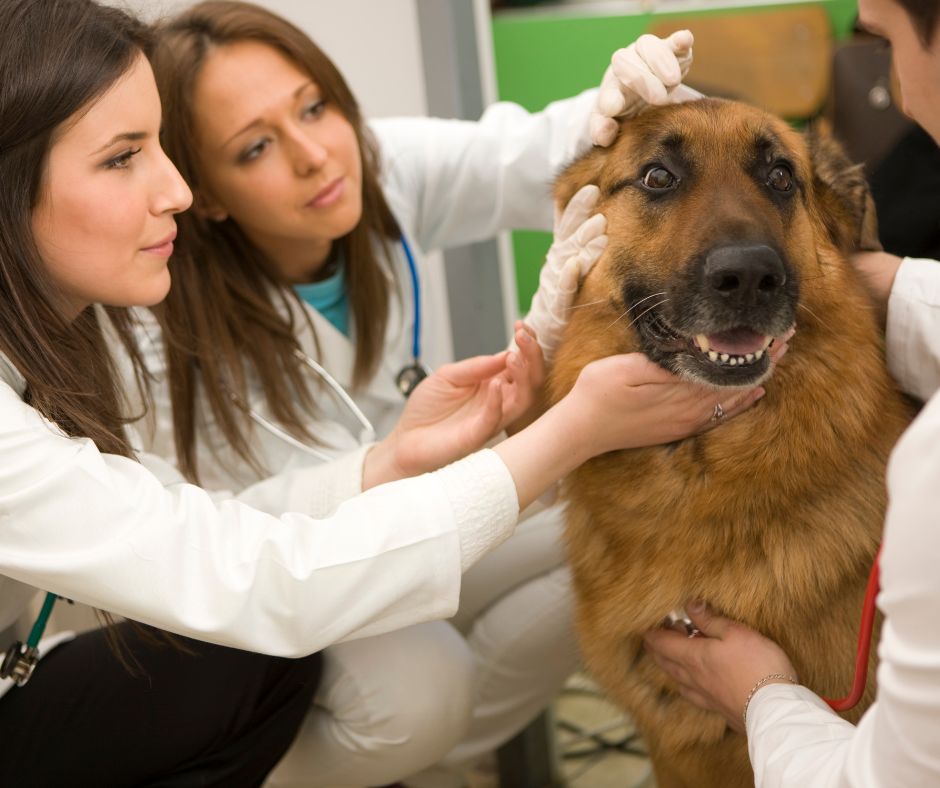So you want to know what are the common health problems in German Shepherds?.
There are a few conditions that German Shepherd dogs seem to be more prone to as a breed. Whilst this is not an exhaustive list the common ones are as follows:-
- Bloat or GDV (Gastric Dilatation Volvulus)
- Hip Dysplasia
- Elbow Dysplasia
- Hemophilia
- Epilepsy
- Nasal Infections
- DM (Degenerative Myelopathy)
- Exocrine pancreatic insufficiency (EPI)
- Cataracts
- Pannus
- Panosteitis
Bloat or GDV (Gastric Dilatation Volvulus)
Bloat is a life-threatening stomach enlargement condition in German Shepherds.
This condition occurs when the dog eats a large meal too quickly. Too much gas fills the stomach, causing it to dilate and twist. The twisted stomach may disrupt blood flow to the heart.
In severe cases, the condition can cause death within thirty minutes. Your dog may display signs of bloat, such as falling back, fickleness, and front feet down.
The best way to prevent this disease is to make sure that he neither eats too quickly nor eats too much all at once. Feeding three smaller meals a day, instead of one large one, can also prevent this condition.
If your dog experiences bloat, consult your veterinarian immediately as this is a serious medical emergency.
Hip Dysplasia
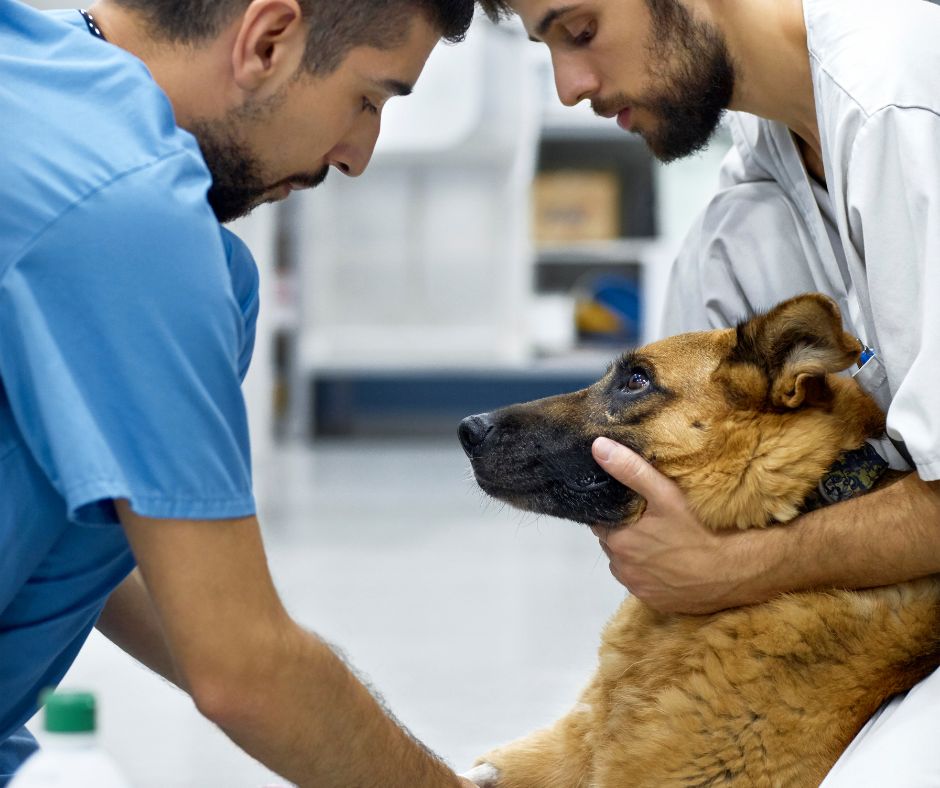
Another common German Shepherd health problem is Hip Dysplasia.
If left untreated, this condition can lead to arthritis, joint pain, and damaged cartilage. Your dog may also show signs of reluctance to exercise, and may favour one leg over the other. Ultimately, your dog may not be able to exercise or perform daily tasks.
Hip Dysplasia is a genetic condition that can be very painful and cause severe lameness. Treatment will depend upon the severity of the condition but usually results in specialist surgery being carried out.
It is now possible to screen German Shepherd Dogs for this condition. It is also a kennel club requirement that responsible breeders wishing to register their puppies carry out this screening on any breeding pair.
They can then take extra precautions to avoid this problem by not breeding dogs with affected hip joints.
The UK Kennel Club’s Breed Specific Requirements and recommendations including health screening.
The USA Kennel Club Health Testing Requirements.
Proper weight management and regular exercise will also help prevent this condition from developing.
Elbow Dysplasia
This condition is similar to Hip Dysplasia above but it involves the elbow joint instead. Treatment and prognosis are the same as for Hip Dysplasia too.
Hemophilia
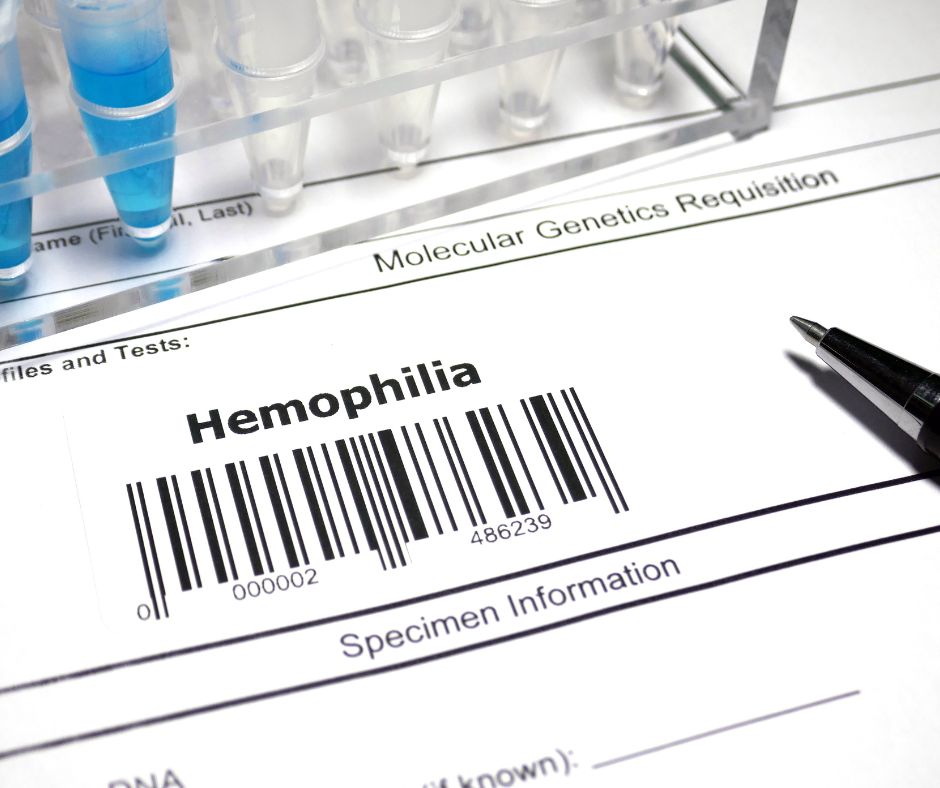
Hemophilia A/Factor VIII Deficiency is another common genetic disorder that German Shepherd Dogs are vulnerable to. It is caused by a deficiency of the coagulation factor VIII (F8), which is a protein necessary for blood clotting.
Affected dogs are likely to have prolonged periods of bleeding following injury or bruise easily. Frequent nosebleeds are also a common symptom that may indicate F8 deficiency.
There is no cure for this condition and owners will have to be careful to ensure their dog avoids traumatic injury where possible. Treatment is usually substitution therapy ie blood transfusion.
Provided they do not suffer any significant bleeding episodes most dogs with this condition can live a happy healthy life.
Epilepsy
German Shepherd Dogs can also be prone to epileptic seizures. There are 2 different types of epilepsy idiopathic and symptomatic.
Symptomatic epilepsy is where there is a known reason for the seizure for example a brain tumour or specific injury. Idiopathic epilepsy is when there is no known cause and this type of epilepsy is thought to be hereditary affecting some German Shepherds.
Dogs with Idiopathic epilepsy usually have their first seizure between 1 and 5 years old and it can last anywhere up to 5 minutes, longer in some cases.
A seizure can present itself in different ways in different dogs. Generally, you can usually expect a dog to become stiff and paddle the air with its legs, they will be disoriented and sometimes even lose consciousness.
They may also lose control of their bladder or bowels, salivate, have some altered vision or stare into space. It is also not unusual for there to be some muscle twitching or your dog may snap their jaws too.
If you believe your dog is experiencing a seizure do not touch their head as you could get bitten. Just make sure they are safe from hurting themselves on furniture or anything else that may be surrounding them. Also, try to keep them cool as prolonged seizures can cause them to overheat.
You should then get them seen by the vet as soon as possible. Your vet will be able to run some tests and discuss with you a treatment plan. Medication may be prescribed if your dog is suffering regular and prolonged seizures.
Nasal Aspergillosis
Although not a genetic condition German Shepherds can be susceptible to nasal aspergillosis. This is an infection of the nose and sinuses which is caused by the fungus aspergillosis. It is thought German Shepherds are vulnerable to this due to their long noses.
The infection causes swelling of the nasal passages and if left untreated can damage nasal bones. In severe cases, it can also enter the sinuses or lungs which is harder to treat.
Dogs can pick up the aspergillus fungus spores from anywhere in the environment but it is usually from the soil or dried grasses such as hay.
Nasal aspergillosis is difficult to diagnose as the symptoms are very similar to other types of less serious nasal infections. Dogs suffering from this condition are likely to have blood in the nasal discharge, and pale discolouration around the nose.
The condition will need veterinary treatment but if caught early enough has a good prognosis.
Degenerative Myelopathy
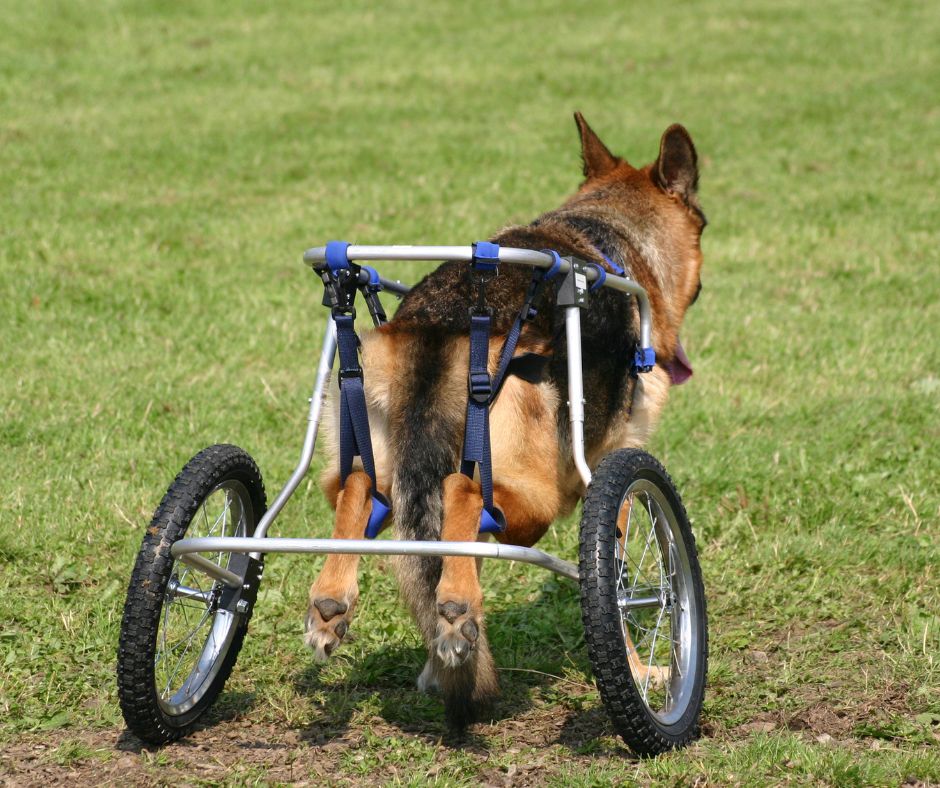
Another very common and well-known disease that affects the German shepherd is DM (Degenerative Myelopathy).
This disease mainly affects the spinal cord, resulting in slowly progressive hind limb weakness and paralysis. The symptoms of this disease result from degeneration of the white matter of the spinal cord.
The exact cause of DM is unknown. It usually affects dogs between 8 and 14 years of age. In its early stages, the symptoms of DM resemble those of arthritis, which often occurs secondary to hip dysplasia in many large breed dogs, making diagnosis difficult.
The Early clinical signs include knuckling, the hindquarters appear to sway when standing still and the dog feels difficulty getting up from a lying position.
In later stages of the disease, these symptoms worsen and the progressive weakness and ataxia (wobbling, stumbling) distinguish it from osteoarthritis of the hip joints.
There is no effective treatment for degenerative myelopathy. It is very important to avoid obesity, so diet and exercise (walking and swimming) are vital components of treatment.
The main goal is to keep the dog on its feet for as long as possible. Physical therapy has been shown to prolong the quality of a dog’s life.
This is a condition that I am all too familiar with as my first German Shepherd Dog Shasha developed it when she was around 12 years old.
Her deterioration was progressive and I can say with confidence that it did not affect her quality of life at all. Initially, she was able to get around by us holding up her back end with a scarf. We later purchased a custom-made wheelchair that she absolutely loved as she was able to get about by herself again.
Despite the condition, she continued to live a happy fulfilled life until she sadly passed away just short of her 15th birthday.
Exocrine Pancreatic insufficiency (EPI)
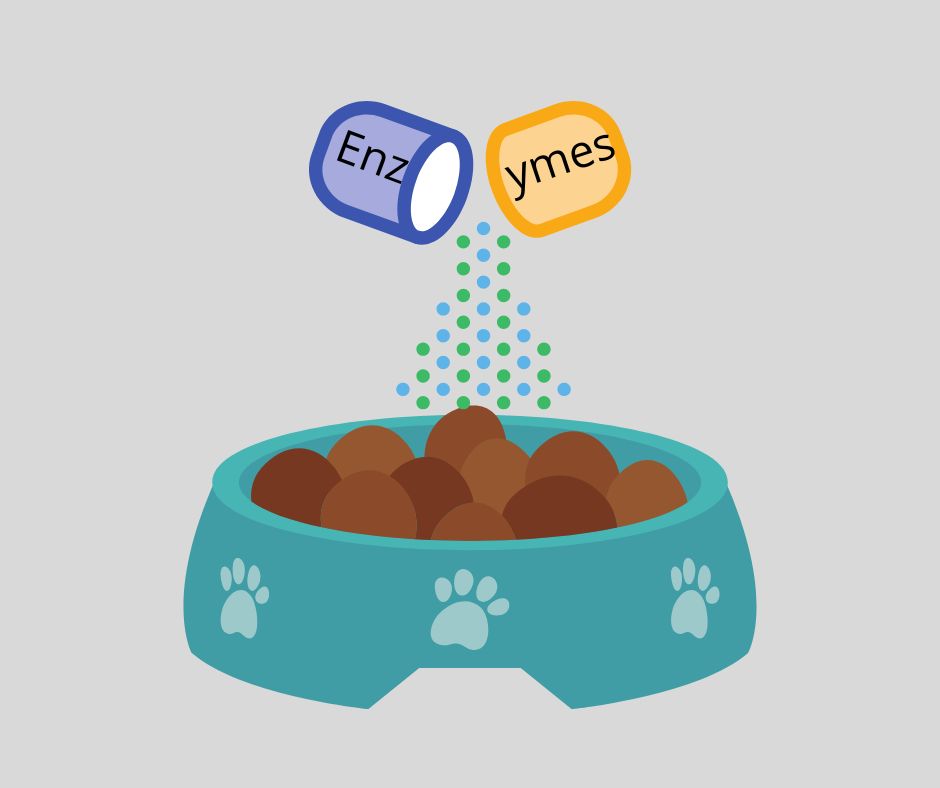
Unfortunately, EPI is also a condition I have first-hand experience with as my male German Shepherd Cody has it.
Exocrine Pancreatic insufficiency is one of the life-threatening diseases German Shepherds can get. Left untreated dogs will literally starve to death despite eating huge amounts of food. There is no cure for it but once diagnosed it is very easy to treat just by adding enzyme supplements to their food.
In this disease, the pancreas is not able to produce sufficient pancreatic enzymes to digest fats, carbohydrates, and proteins. This difficulty in digestion leads to poor absorption of nutrients which mainly causes weight loss despite a normal or increased appetite.
The most common clinical signs are a large volume of foul-smelling, greasy, steatorrhoea faeces (fat in the stool), occasional vomiting, and gradual weight loss over a period of months. Affected dogs progressively lose body condition whilst remaining very hungry and eating profusely.
Cody developed this when he was around 2 years old. He started with severe diarrhoea which just looked like pale yellowy brown cow pats. His stomach also made severe rumbling noises and he had terrible foul-smelling wind which was a result of the bacteria build-up from undigested food in his small intestine.
This condition is known as SIBO (Small Intestine Bacteria Overgrowth) which is common in dogs with EPI. Not all dogs with EPI have it and SIBO can also exist as a condition independent of EPI too.
Shortly after these symptoms developed he began to lose weight quite dramatically and of course, we were extremely worried. After various tests for other conditions came back negative a simple blood test eventually diagnosed his condition and I am pleased to say that with treatment he is now doing extremely well.
The treatment of EPI is expensive and lifelong but very easy to manage. Highly digestible, low-fat diets together with pancreatic enzyme replacement which you just sprinkle onto your dog’s food can help them live a normal healthy life.
Cataracts
Cataracts are another common German Shepherd Health Problem. A cataract is a cloudy patch that appears on the lens of your dog’s eye. They can develop in one eye or both and are caused by a recessive gene. They usually develop slowly over several years restricting your dog’s vision and eventually causing blindness.
Cataract surgery is one of the best treatments for this condition. Once the cataract is removed your dog’s vision should be restored.
Pannus (Chronic Superficial Keratitis)
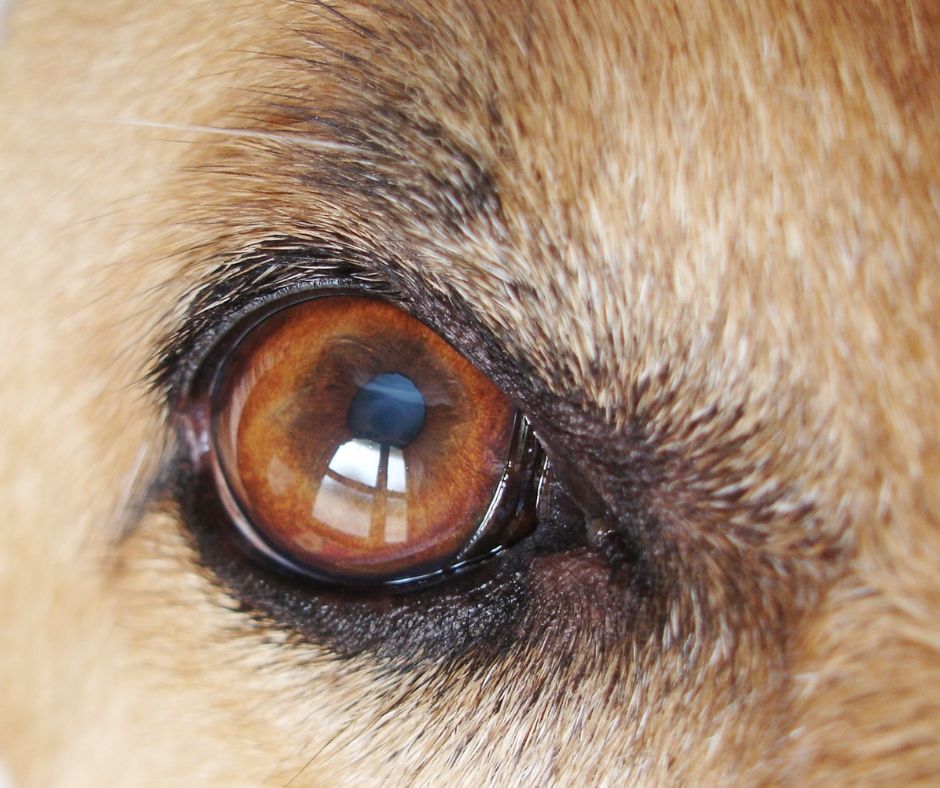
Pannus is another common German Shepherd Health problem affecting the eyes. It is more common in older German Shepherd dogs and again is thought to be a hereditary condition.
It may first appear as a red mass on the cornea of one or both eyes and later the third eyelid may also become inflamed. Whilst it cannot be cured treatment can halt its progression and reduce some of the effects.
If left untreated, aside from the discomfort and pain, this disease can cause total blindness. Treatment involves medicated eye drops and early detection can help prevent scarring.
In severe cases, the treatment for pannus may also involve amputation of the affected eye. A German shepherd with pannus is also at risk of developing cataracts.
Panosteitis
This is a painful condition affecting the mid-shaft of the long bone of the dog’s legs causing bone growth inside of the marrow. Affected dogs will usually begin to limp and may cry out in pain if pressure is put on the bone.
It usually affects German Shepherd Dogs between 6 months and 2 years old and appears to resolve itself over time.
High protein diets can make a dog susceptible to the condition so feeding a good quality dog food formulated for large breed dogs can help reduce the risk of the condition developing. Dogs diagnosed with the condition will need to be treated with pain relief until the symptoms resolve.
Why Do German Shepherds Have So Many Health Problems?
The German Shepherd Dog as we know it today is a relatively new breed with was developed by a man named Max Emil Frederich von Stephanitz in 1899.
In order to set desired traits in the breed, he undertook a selective breeding program which involved inbreeding. Whilst the desired traits were achieved it unfortunately also led to the German Shepherd Dog being more prone to certain hereditary conditions too.
Not all health problems suffered by the German Shepherd Dog are hereditary though. As is the case with other breeds of dog many are usually just related to their size, weight, and lifestyle or they are a result of physical injuries.
Do All German Shepherds Have Health Issues?
The good news is that not all German Shepherd Dogs have health issues. Despite these known health risks, the German Shepherd Dog is not classed as an unhealthy breed.
They actually have quite a good average lifespan for a large breed dog with many going on to live to be 14 or 15 years old.
Also, breeders today are very much aware of hereditary conditions and are taking steps to minimise the risk of breeding puppies that are likely to be prone to them.
How To Avoid Getting A German Shepherd Puppy With Health Issues

Unfortunately, it’s not possible to avoid getting a German Shepherd Puppy with health issues.
But …
It is possible to minimise this risk by making sure you only get your puppy from a reputable breeder. As I mentioned above they are fully aware of the health risks associated with the breed due to genetics and the last thing they want is to breed sick puppies.
They will ensure that they breed only the healthiest of dogs whose genetic history will have been researched for any signs of potential issues.
What Health Tests Should German Shepherds Have?
It is now also possible to screen breeding pairs for hip and elbow dysplasia. Breeders can also arrange DNA tests to check for markers of DM and remove any dogs predisposed to these conditions from their breeding programs.
Although it is not possible to screen for every condition that a German Shepherd Dog may be prone to these measures will help to reduce the risk of many future generations of puppies born to reputable breeders developing some of them.
How Do I Give My German Shepherd The Best Life?
Here are a few tips on how you can give your German Shepherd the best life.
#1 Tip Prevention Is Best
As with most things in life it is far better and cheaper to prevent something than try to cure it. Minimise your risk of purchasing a puppy with health issues by making sure you only use a reputable breeder who has carried out all tests on your puppy’s parents prior to breeding them.
#2 Tip Where Not To Buy A German Shepherd Puppy From
Avoid buying a puppy from puppy mills, pet stores, backyard breeders or unknown people you happen to meet who say they are selling puppies. Whilst these puppies will, without doubt, be adorable they are unfortunately the ones most at risk of developing health issues.
The money you might think you are saving here is nothing you may have to spend later on. Not to mention the heartbreak of having to watch your beloved companion suffer. The more people that avoid these types of places the fewer puppies these people will breed as the demand will not be there.
Learn More: Make Choosing A German Shepherd Puppy Easier
#3 Tip Feed A Healthy Balanced Diet
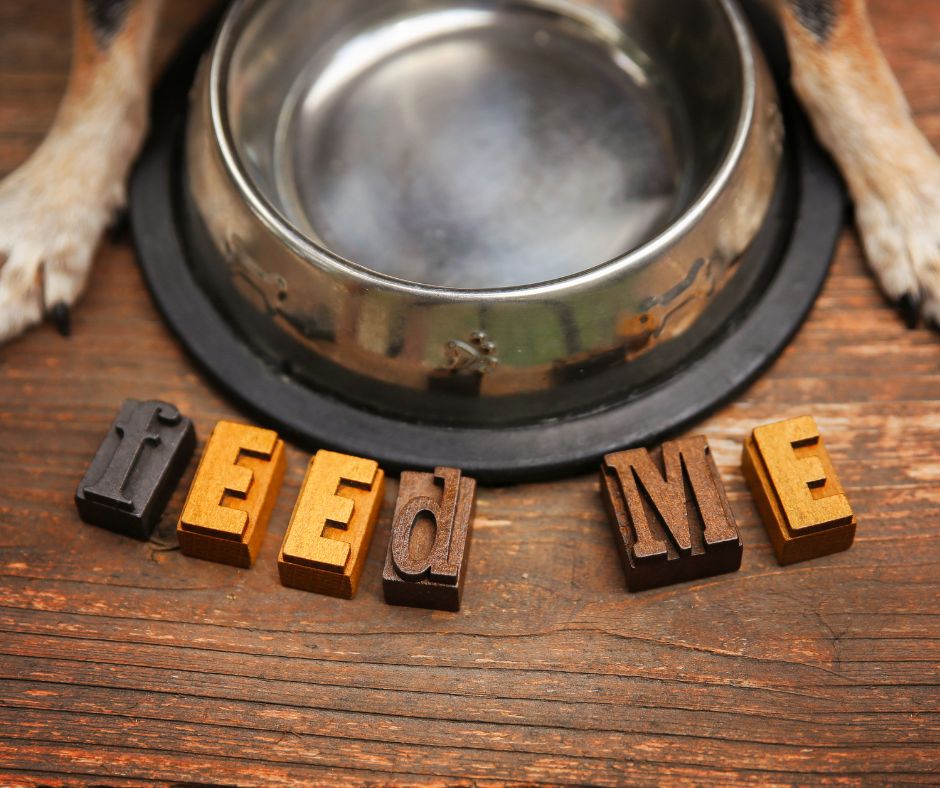
Make sure you feed your dog a healthy balanced diet. You don’t have to know pet nutrition to feed your dog a healthy diet either. The pet food manufacturers have already done all the hard work for us.
The best food to feed a German Shepherd is a high-quality commercial kibble that has been formulated for large breed puppies and/or large breed adult dogs. Large breed dogs such as German Shepherds grow at a slower rate than small breeds.
If they are fed the wrong type of food they are at risk of growing too quickly which can result in their bones not developing correctly.
Learn More: How to Feed A German Shepherd Puppy The Right Way
#4 Tip Ensure Your Dog Gets Plenty Of Healthy Physical And Mental Exercise.
German Shepherd Dogs need plenty of exercise both physically and mentally for their health and well-being. Walks in the park and games such as fetch are ideal.
#5 Tip Know How To Groom Your German Shepherd Correctly
German Shepherd dogs don’t need to bathe often but they will need to be brushed regularly especially around shedding time twice a year. You will also need to take care of their dental health and keep their nails trimmed.
Learn More: How to Groom A German Shepherd Easily At Home
#6 Tip Keep Up To Date With Worming, Tick And Flea Treatments
German Shepherd Dogs are just as vulnerable to parasites as any other dog. Some parasites such as heartworm can cause serious health issues in dogs but any parasite infection will result in your dog losing condition.
Keeping up to date with their regular treatment program will keep your dog both feeling and looking great.
#7 Tip Take Them For Regular Health Checks
Veterinary fees can be expensive and if money is tight it is easy to put taking your dog to the vet for a routine check-up to the bottom of the priority list. This is especially so if they appear to be fit and well.
Many conditions that our dogs can suffer from are ones that can be spotted early and the earlier a condition is treated the better the prognosis. It, therefore, makes sense to take them for a check-up at least once a year, every 6 months if possible.
#8 Tip Give Them Lots Of Love

Finally, just give them lots of love and cuddles. The reason German Shepherd Dogs make such good family pets is that they are social dogs that are also extremely loyal to their owners. They thrive best being around you and love to get involved in family life.
Their emotional needs are just as important as their physical ones to ensure they maintain optimum health and quality of life.
Final Thoughts On Common Health Problems In German Shepherds
No matter which dog breed you welcome into your family, there are going to be all sorts of health issues that you may have to face at one point or another.
You can help minimise the risk of this by ensuring that you buy your puppy from a reputable and responsible breeder who has undertaken the appropriate screening of their dogs to ensure their puppies get the best start in life.
If you then make sure you provide your puppy with a balanced diet, a healthy lifestyle and give then lots of love you are well on your way to ensuring your puppy has a great quality of life.
Regular checkups with your veterinarian can also help spot any issues early which will help your dog live a happy long life.
As always if you want to share your own experiences then please feel free to do so in the comments. Thanks for reading.
